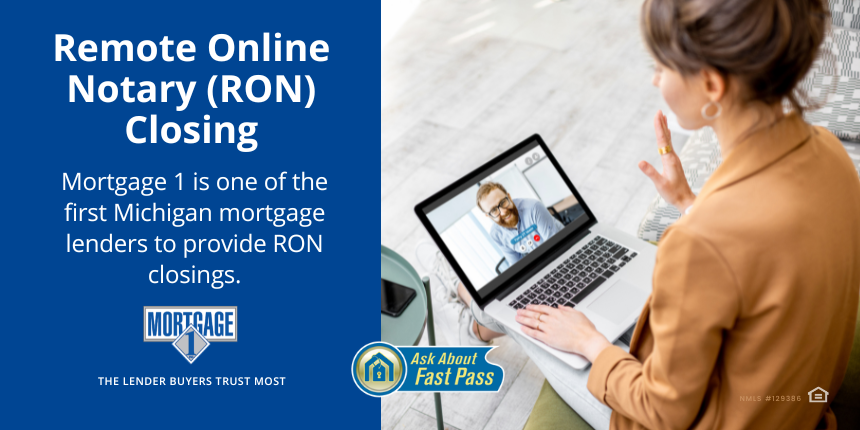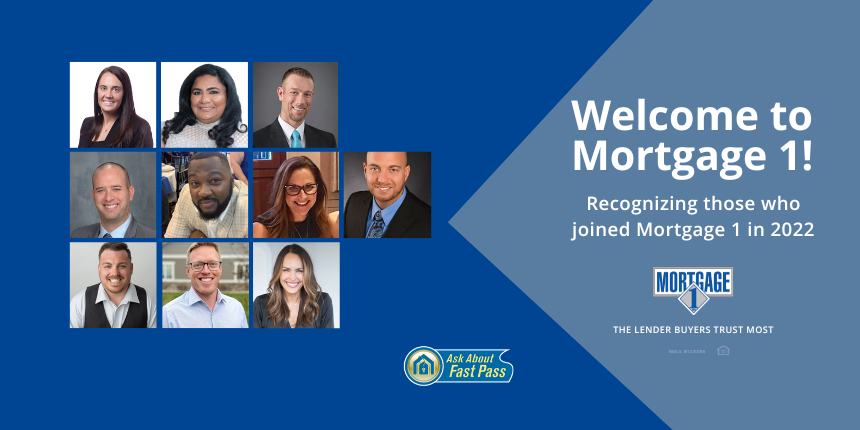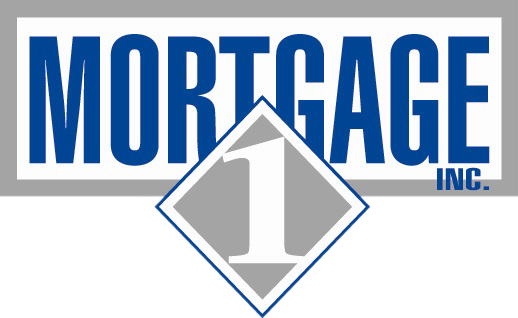
Mortgage 1 Breaks Ground with Remote Online Notary (RON) Closing
December 15, 2022
Welcome Those Who Joined Mortgage 1 in 2022
January 10, 2023Mortgage 1 offers multiple loan options for first-time home buyers. These include:
- FHA loans: These loans are backed by the Federal Housing Administration (FHA) and are available to first-time home buyers with low credit scores. They require a down payment of at least 3.5% of the purchase price.
- VA loans: These loans are available to military veterans and their families and are backed by the Department of Veterans Affairs (VA). They do not require a down payment and may have more flexible credit requirements.
- USDA loans: These loans are available to buyers in rural areas and are backed by the U.S. Department of Agriculture (USDA). They do not require a down payment and may have more flexible credit requirements.
- Conventional loans: These loans are not backed by the government and may have stricter credit and down payment requirements. However, they often have lower mortgage insurance premiums and may be a good option for buyers with good credit and a down payment of at least 5%.
- State and local assistance programs: Many states and local governments offer assistance programs for first-time home buyers, including down payment assistance, low-interest loans, and grants.
It’s a good idea to compare the different loan options and assistance programs available to you and speak with a lender to determine which one is the best fit for your needs.
| Need Help Getting Your First Mortgage? Call us at 1-866-532-0550 or locate a Mortgage 1 loan officer near you. Better yet, get the process started quickly and easily yourself with our digital mortgage app. |
FHA Loans
FHA loans are mortgage loans that are insured by the Federal Housing Administration (FHA). They are a popular option for first-time home buyers because they have more flexible credit and down payment requirements than conventional loans.
To qualify for an FHA loan, you typically need a credit score of at least 580 and a down payment of at least 3.5% of the purchase price of the home. However, some lenders may have higher credit score requirements. FHA loans also have more lenient income and debt-to-income ratio requirements than conventional loans.
One of the main benefits of FHA loans is that they require a smaller down payment than conventional loans, making them more accessible for first-time home buyers who may not have a large down payment saved up. FHA loans also have less strict credit requirements, so they may be a good option for borrowers who have a lower credit score or a limited credit history.
However, FHA loans do have some drawbacks. They typically have higher mortgage insurance premiums than conventional loans, and they may have limits on the amount you can borrow. They also have stricter guidelines for the condition of the home you can purchase, so you may have a harder time finding a home that meets the requirements.
VA Loans
VA loans are mortgage loans that are guaranteed by the Department of Veterans Affairs (VA). They are available to military veterans, active-duty service members, and their families and are designed to help them afford the purchase of a home.
One of the main benefits of VA loans is that they do not require a down payment. This can be a significant advantage for military borrowers who may not have the funds available for a down payment on a conventional loan. VA loans also have more flexible credit requirements than conventional loans, so they may be a good option for borrowers with less-than-perfect credit.
In addition to not requiring a down payment, VA loans also have competitive interest rates and do not require mortgage insurance. They also have limits on closing costs, which can help make the process of buying a home more affordable.
To qualify for a VA loan, you must be a military veteran, active-duty service member, or a surviving spouse of a veteran who died in service or from a service-related disability. You also need to have a certificate of eligibility from the VA to show that you are eligible for the loan.
VA loans have some limitations, including limits on the amount you can borrow and restrictions on the type of property you can purchase. They are also only available to certain borrowers, so they may not be an option for everyone.
USDA Loans
USDA loans are mortgage loans that are backed by the U.S. Department of Agriculture (USDA). They are designed to help low- and moderate-income buyers in rural areas afford the purchase of a home.
One of the main benefits of USDA loans is that they do not require a down payment. This can be a significant advantage for buyers who may not have the funds available for a down payment on a conventional loan. USDA loans also have more flexible credit requirements than conventional loans, so they may be a good option for borrowers with less-than-perfect credit.
In addition to not requiring a down payment, USDA loans also have competitive interest rates and do not require mortgage insurance. They also have limits on closing costs, which can help make the process of buying a home more affordable.
To qualify for a USDA loan, you must meet certain income and credit requirements and be purchasing a home in a designated rural area. You must also be a U.S. citizen or permanent resident and have a stable income and employment history.
USDA loans have some limitations, including limits on the amount you can borrow and restrictions on the type of property you can purchase. They are also only available to certain borrowers in specific areas, so they may not be an option for everyone.
Conventional Loans
Conventional home loans are mortgage loans that are not backed by the government. They are offered by private lenders and typically have stricter credit and down payment requirements than government-backed loans.
One of the main benefits of conventional loans is that they often have lower mortgage insurance premiums than government-backed loans. This can make them a more cost-effective option for borrowers who have a down payment of at least 5% of the purchase price of the home. Conventional loans also have a wider range of loan terms, so borrowers have more flexibility in terms of repayment.
To qualify for a conventional loan, you typically need a credit score of at least 620 and a down payment of at least 5% of the purchase price of the home. However, some lenders may have higher credit score requirements. Conventional loans also have strict income and debt-to-income ratio requirements, so it’s important to carefully review these requirements before applying.
Conventional loans have some drawbacks, including stricter credit and down payment requirements, which can make them less accessible for some borrowers. They may also have higher interest rates than some other loan options, such as VA loans. However, they can be a good option for borrowers who have a higher credit score, a larger down payment, and a stable income and employment history.
State of Michigan Assistance Programs
The State of Michigan offers several assistance programs for first-time home buyers and others who need help with the cost of purchasing a home. These programs include:
- Michigan State Housing Development Authority (MSHDA): This agency offers several programs that provide down payment assistance and low-interest loans to eligible home buyers. These programs include the MI First Home and MI Next Home programs.
- Michigan HOME Program: This program provides grants and deferred loans to eligible home buyers to help with the cost of purchasing a home. It is administered by local participating organizations throughout the state.
- Michigan Hardest Hit Fund: This program provides assistance to homeowners who are struggling to make their mortgage payments due to circumstances such as job loss or reduced income. It offers mortgage payment assistance and unemployment bridge loans.
- Federal Home Loan Bank of Indianapolis (FHLBI): This organization offers the HOMEownership Made Easier (HOME) program, which provides grants to eligible first-time home buyers to help with the cost of purchasing a home.
Many other states offer similar programs.
We Specialize in Helping First-Time Buyers
If you need help with the mortgage process, call Mortgage 1 at 1-866-532-0550 or locate a Mortgage 1 loan officer near you to get the ball rolling. Better yet, use our digital mortgage app to get preapproved. It’s fast and easy!





